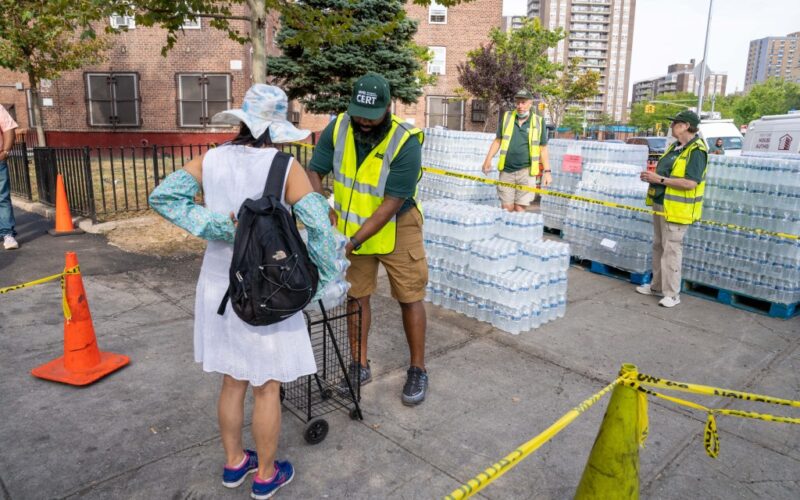If we want safe water in New York City, we can’t “plastic bottle” our way out of the problem. NYC can lead with solutions that protect both our health and planet from toxic plastic pollution.
You’ve probably seen headlines warning that the average person now has a plastic spoon’s worth of microplastics in their brain. It’s a disturbing wake-up call to how deeply plastic pollution has infiltrated both our environment and our bodies.
What’s less often discussed is how plastic pollution intersects with other urgent public health issues — like ongoing unsafe drinking water right here in NYC.
At Cooper Square Committee, we work to protect tenants from lead exposure — a serious health threat in many NYC homes. One major source of contamination is the city’s aging infrastructure: lead service lines and outdated plumbing that carry water directly into people’s homes.
While lead paint remains a primary hazard, NYC has a reported minimum of 112,000 lead pipes, poisoning drinking water and endangering residents every time they turn on the tap. An interactive map is available for residents to see if they are affected. High-profile cases like Flint, Mich., and more recently Syracuse, remind us that many communities are still at risk of disastrous water crises, and NYC is not immune.
But here’s the irony: when a water quality crisis like lead contamination hits a community, local and state governments often respond by delivering mountains of plastic bottled water to those in need — or leaving families to buy it themselves at hundreds to thousands of times the cost of tap water.
One of us, Jodie, lived in a New York building with many serious issues from roaches and mice to routinely brown and dirty water. So she decided to test the tap with a kit from the city, and unsurprisingly, it came back positive for lead.
When she met with her neighbors to discuss the problems, some of them decided to buy bottled water, another additional expense for working people who were already rent-burdened. This loss of trust in the quality of our water for drinking, cooking, and bathing created further problems with plastic waste.
This false solution doesn’t rebuild trust in tap water — it creates long-term dependence on single-use plastic bottles, which leach toxic chemicals and microplastics into the water.
Plastics are made of fossil fuels and producing bottles demands 2,000 times more energy than tap water. And the myth of recycling doesn’t hold up: most plastic bottles, like all plastics, end up incinerated, buried, or polluting the environment, where they break up into toxic microplastics.
We now reap the consequences of decades of plastic pollution, an environmental crisis many experts consider as massive as climate change. One recent study found that plastics cost the global economy more than $1.5 trillion in health-related damages each year. Exposure to plastic chemicals is linked with cancers, infertility, and other serious health problems. Plastic has never been a real fix — it’s only made environmental and health crises worse.
Access to clean water is a human right. As NYC systematically replaces lead service lines, residents must have safe water in the meantime. The commonsense solution is to distribute water filters certified to remove toxic substances like lead to all impacted households. And when those lead pipes are replaced, they should be swapped with non-toxic materials like recycled copper, not dangerous plastic PVC pipes that will only further exacerbate the problem.
One easy action we can all do is sign the petition to tell the Environmental Protection Agency that while cities and water systems, like in NYC, work to create safer drinking water systems, they should distribute filters. Despite NYC having the largest unfiltered water supply in the U.S. from the upstate watersheds, an estimated 30% of service lines in the city are made of lead.
Filters offer a temporary and affordable solution that alleviates the financial, human health, and planetary costs of single-use plastic water bottles: addressing both the immediate need for clean water and fighting the plastic pollution crisis at the same time.
Local governments should provide free filters to impacted households. For residents looking to protect themselves now, filters are far more affordable than relying on bottled water — if you have the means to purchase one, be sure it’s certified (NSF/ANSI Standard 53) to remove lead and suited to your home. Everyone deserves safe tap water. Filters help rebuild public trust in this vital public good.
Clean water without plastic pollution is possible. We just have to demand it.
Leidecker is the lead organizer of the Cooper Square Committee. Bustamante is the campaign coordinator of the Plastic Pollution Coalition.








